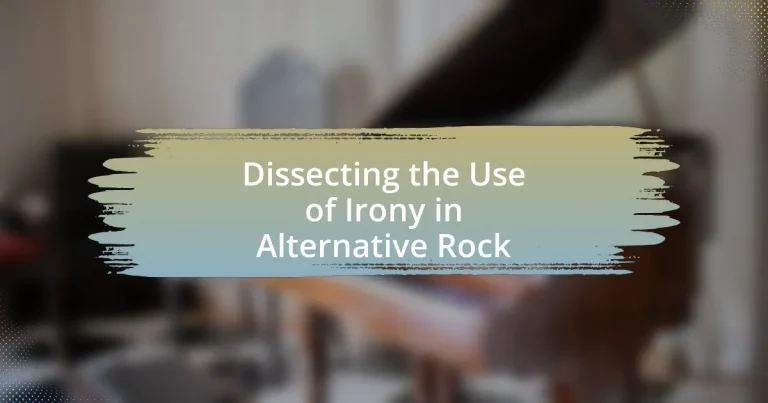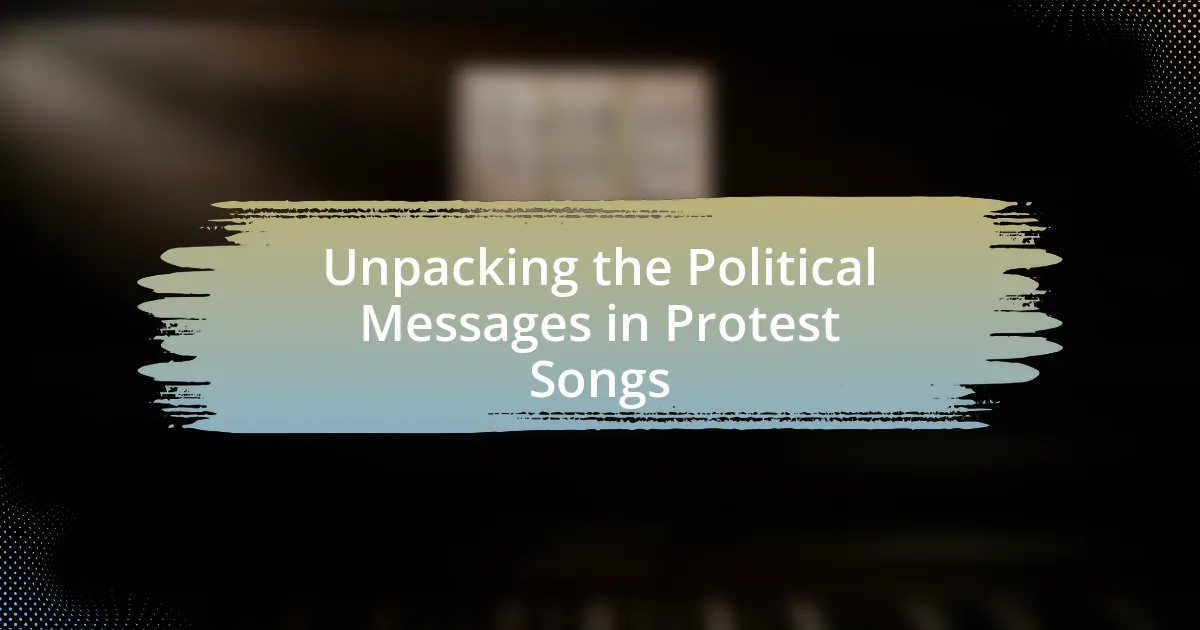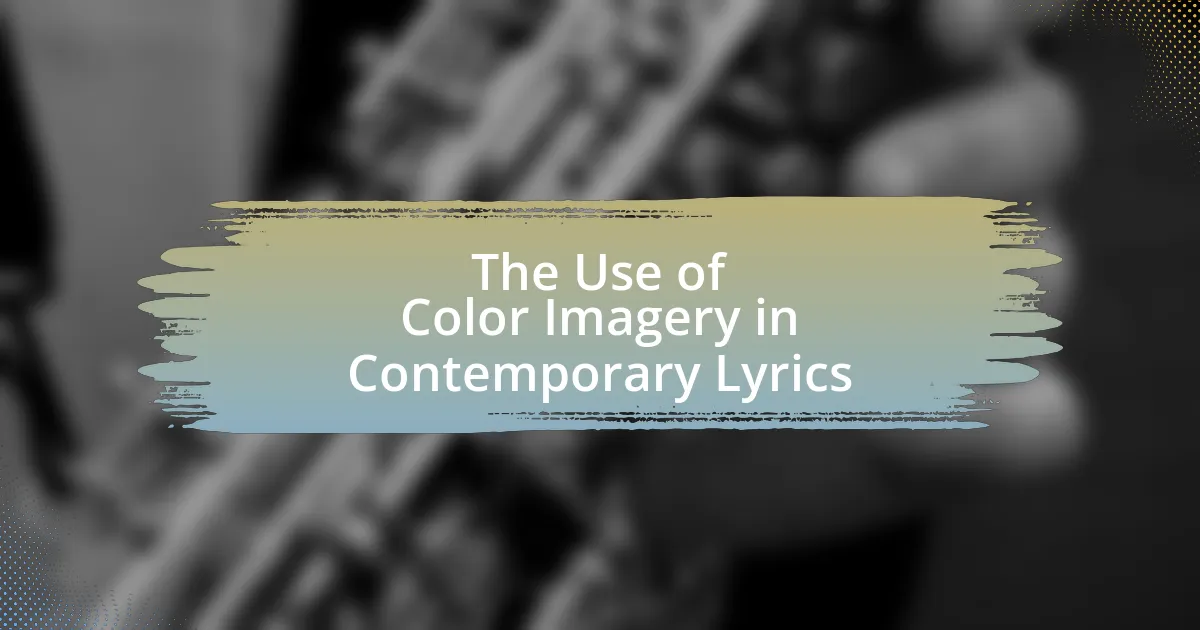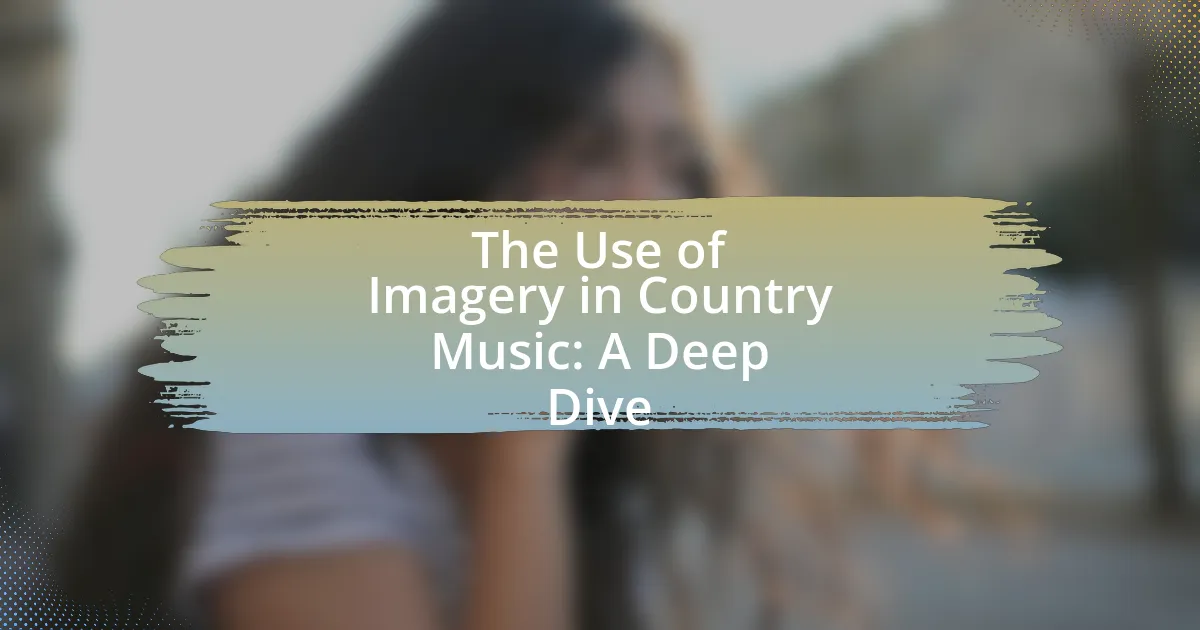The article examines the role of irony in alternative rock, highlighting its significance in expressing complex emotions and critiquing societal norms. It explores how artists like Nirvana and Radiohead utilize irony through juxtaposition, sarcasm, and subversion to address themes of disillusionment and existential angst. The discussion includes historical context, key examples of ironic lyrics, and the impact of irony on audience reception, emphasizing its evolution from a tool of critique in the 1990s to a more nuanced expression in contemporary music. Additionally, the article outlines techniques for analyzing irony in alternative rock, providing insights into how listeners can identify and interpret ironic elements in songs.
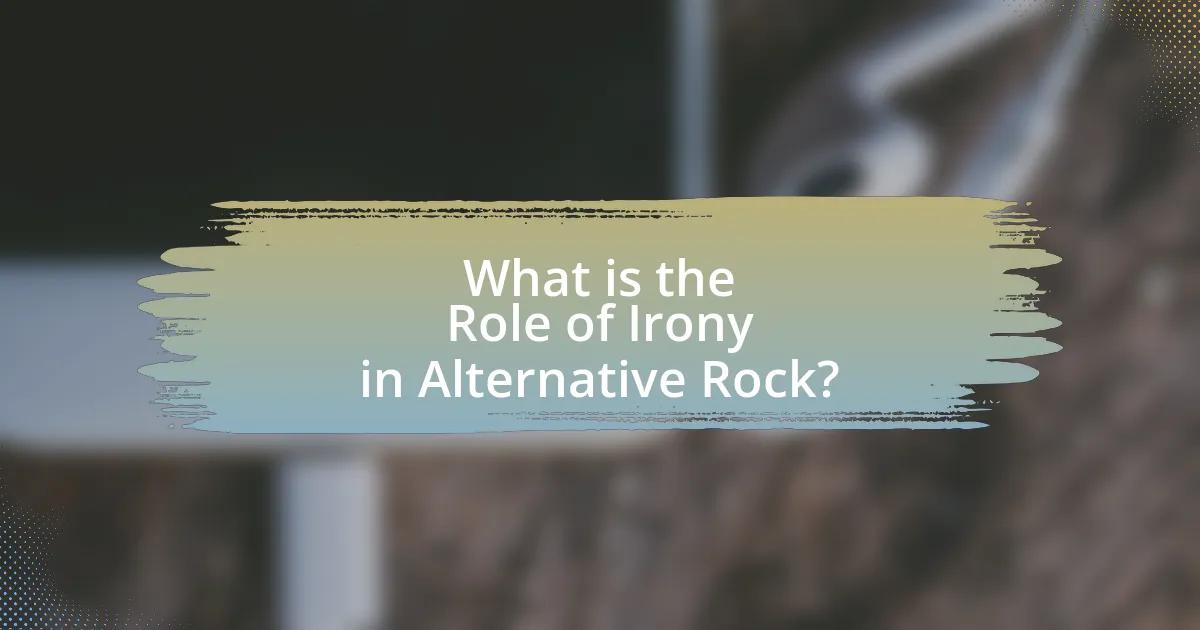
What is the Role of Irony in Alternative Rock?
Irony plays a crucial role in alternative rock by allowing artists to express complex emotions and critique societal norms through juxtaposition and subversion. This genre often employs irony to challenge mainstream culture, using sarcastic lyrics and contrasting musical styles to convey deeper meanings. For instance, bands like Nirvana and Radiohead utilize irony to address themes of disillusionment and existential angst, effectively resonating with listeners who seek authenticity in a commercialized music landscape. The use of irony not only enhances lyrical depth but also fosters a sense of connection among fans who appreciate the nuanced commentary on contemporary issues.
How has irony been historically utilized in alternative rock music?
Irony has been historically utilized in alternative rock music as a means to critique societal norms and express disillusionment. Bands like Nirvana and Radiohead employed irony in their lyrics and sound to challenge mainstream culture and convey feelings of alienation. For instance, Nirvana’s “Smells Like Teen Spirit” juxtaposes catchy melodies with lyrics that express apathy, highlighting the contradictions of youth culture in the early 1990s. Similarly, Radiohead’s “Creep” uses ironic self-deprecation to explore themes of inadequacy and societal expectations. This use of irony not only resonates with listeners but also serves as a powerful tool for social commentary, reflecting the complexities of modern life.
What are some key examples of irony in early alternative rock songs?
Key examples of irony in early alternative rock songs include “Smells Like Teen Spirit” by Nirvana, which critiques teenage apathy while becoming an anthem for youth rebellion. Another example is “Losing My Religion” by R.E.M., where the title suggests a loss of faith, yet the lyrics convey a deep yearning for connection and understanding. Additionally, “Creep” by Radiohead presents a narrative of self-loathing and alienation, contrasting the desire for acceptance with feelings of inadequacy. These songs illustrate irony through their juxtaposition of themes and emotions, often highlighting the contradictions inherent in personal and societal experiences.
How did the cultural context of the 1990s influence the use of irony in alternative rock?
The cultural context of the 1990s significantly influenced the use of irony in alternative rock by reflecting societal disillusionment and a reaction against mainstream culture. This era was marked by events such as the end of the Cold War, economic uncertainty, and the rise of consumerism, which led artists to adopt irony as a means of critiquing societal norms and expectations. Bands like Nirvana and Radiohead utilized irony to express feelings of alienation and skepticism towards commercialism, as seen in songs like “Smells Like Teen Spirit” and “Creep.” The prevalence of postmodernism during this decade further encouraged the blending of styles and the questioning of authenticity, allowing irony to flourish as a tool for commentary on both personal and collective experiences.
Why is irony significant in the lyrics of alternative rock?
Irony is significant in the lyrics of alternative rock because it allows artists to convey complex emotions and critique societal norms in a nuanced manner. This genre often employs irony to juxtapose serious themes with a playful or sarcastic tone, enabling listeners to engage with difficult subjects like alienation, disillusionment, and identity. For instance, bands like Radiohead and Nirvana utilize ironic lyrics to reflect the contradictions of modern life, effectively resonating with audiences who appreciate the depth and authenticity that irony brings to their music. This use of irony not only enhances lyrical meaning but also fosters a sense of connection between the artist and the listener, making it a vital element in alternative rock’s expressive toolkit.
What themes are commonly explored through ironic lyrics in alternative rock?
Ironic lyrics in alternative rock commonly explore themes of disillusionment, societal critique, and existential angst. Disillusionment is often reflected in lyrics that juxtapose idealistic notions with harsh realities, as seen in songs like “Smells Like Teen Spirit” by Nirvana, which critiques the apathy of youth culture. Societal critique is prevalent in tracks that highlight consumerism and conformity, such as “American Idiot” by Green Day, which uses irony to challenge American values. Existential angst is conveyed through lyrics that question identity and purpose, exemplified in Radiohead’s “Creep,” where the irony lies in the contrast between self-perception and societal expectations. These themes resonate with listeners, making ironic lyrics a powerful tool for commentary in alternative rock.
How do artists use irony to convey deeper meanings in their songs?
Artists use irony in their songs to highlight contradictions between expectations and reality, thereby conveying deeper meanings. For instance, a song may present a cheerful melody while discussing themes of heartbreak or despair, creating a stark contrast that prompts listeners to reflect on the underlying message. This technique allows artists to engage their audience on multiple levels, encouraging them to question societal norms or personal experiences. A notable example is Alanis Morissette’s “Ironic,” where the lyrics illustrate various ironic situations that reveal the unpredictability of life, prompting listeners to consider the complexities of their own experiences.
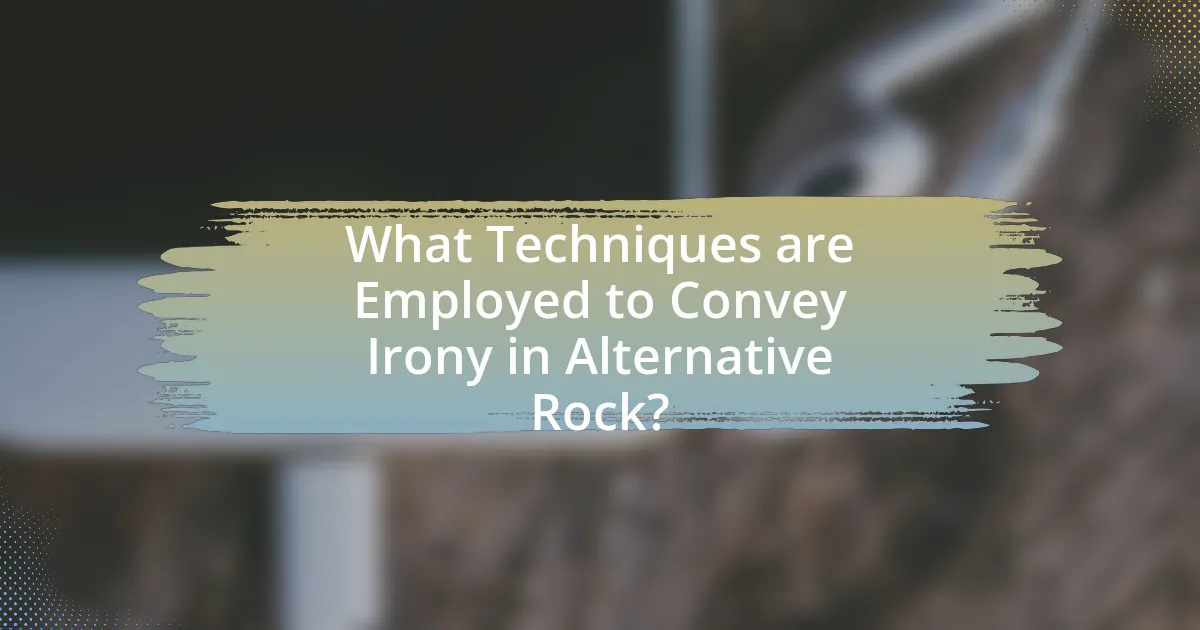
What Techniques are Employed to Convey Irony in Alternative Rock?
Alternative rock employs various techniques to convey irony, including juxtaposition, sarcasm, and subversion of expectations. Juxtaposition is often used in lyrics where contrasting themes or images highlight the irony, such as pairing upbeat melodies with dark or cynical lyrics. Sarcasm is prevalent in vocal delivery and lyrical content, where artists express a meaning opposite to the literal interpretation, creating a sense of irony. Additionally, subversion of expectations occurs when songs lead listeners to anticipate a certain narrative or emotional response, only to deliver an unexpected twist, further emphasizing the ironic message. These techniques are evident in works by bands like Radiohead and Nirvana, where irony serves to critique societal norms and personal experiences.
How do musical elements enhance the ironic message in alternative rock?
Musical elements enhance the ironic message in alternative rock by utilizing contrasting dynamics, unconventional song structures, and lyrical dissonance. For instance, the juxtaposition of upbeat melodies with dark or cynical lyrics creates a sense of irony, as seen in songs like “Loser” by Beck, where the cheerful instrumentation contrasts with themes of failure and alienation. Additionally, alternative rock often employs abrupt shifts in tempo and volume, which can emphasize the absurdity of the lyrics, further reinforcing the ironic tone. This technique is evident in Radiohead’s “Creep,” where the soft verses lead into a powerful chorus, highlighting the emotional conflict and irony in the lyrics about self-worth. These musical choices effectively amplify the ironic messages, making them more impactful and resonant with listeners.
What role do contrasting melodies and rhythms play in creating irony?
Contrasting melodies and rhythms play a crucial role in creating irony by juxtaposing emotional content with unexpected musical elements. In alternative rock, this technique often manifests when a cheerful melody accompanies dark or cynical lyrics, leading to a dissonance that highlights the irony. For example, the song “Pumped Up Kicks” by Foster the People features an upbeat melody paired with lyrics about youth violence, creating a stark contrast that emphasizes the underlying message. This use of contrasting musical elements not only engages listeners but also deepens the thematic complexity, making the irony more pronounced and impactful.
How does instrumentation contribute to the ironic tone of a song?
Instrumentation contributes to the ironic tone of a song by juxtaposing musical elements that convey contrasting emotions or messages. For instance, upbeat melodies paired with dark or cynical lyrics create a dissonance that highlights the irony. This technique is prevalent in alternative rock, where artists often use cheerful instrumentation to mask deeper, more serious themes, thereby enhancing the ironic effect. A notable example is the song “Pumped Up Kicks” by Foster the People, where the catchy, upbeat sound contrasts sharply with lyrics addressing youth violence, effectively illustrating how instrumentation can amplify irony in music.
What lyrical devices are commonly used to express irony in alternative rock?
Lyrical devices commonly used to express irony in alternative rock include sarcasm, juxtaposition, and hyperbole. Sarcasm allows artists to convey a meaning opposite to the literal interpretation, often highlighting societal issues or personal struggles. Juxtaposition contrasts two opposing ideas or images, creating a sense of irony by placing them side by side, which can reveal deeper truths about the subject matter. Hyperbole exaggerates statements to an extreme degree, often to emphasize the absurdity of a situation, thus reinforcing the ironic tone. These devices are frequently employed by alternative rock artists to critique cultural norms and express complex emotions.
How do paradoxes and contradictions function in alternative rock lyrics?
Paradoxes and contradictions in alternative rock lyrics serve to express complex emotions and highlight the tension between opposing ideas. These lyrical devices create a sense of authenticity and relatability, allowing listeners to connect with the multifaceted nature of human experience. For example, songs like “Creep” by Radiohead juxtapose feelings of inadequacy with a desire for acceptance, illustrating the internal conflict many individuals face. This use of paradox not only enhances the emotional depth of the lyrics but also invites listeners to reflect on their own contradictions, reinforcing the genre’s exploration of irony and existential themes.
What is the impact of sarcasm and satire in the songwriting process?
Sarcasm and satire significantly enhance the songwriting process by allowing artists to convey complex emotions and critique societal norms in a relatable manner. These techniques enable songwriters to express discontent or humor while engaging listeners, often leading to deeper connections with the audience. For instance, bands like Radiohead and The Arctic Monkeys utilize sarcasm to address themes of disillusionment and social commentary, making their messages more impactful and memorable. This approach not only enriches the lyrical content but also encourages listeners to reflect on the underlying issues presented, demonstrating the effectiveness of irony in alternative rock music.
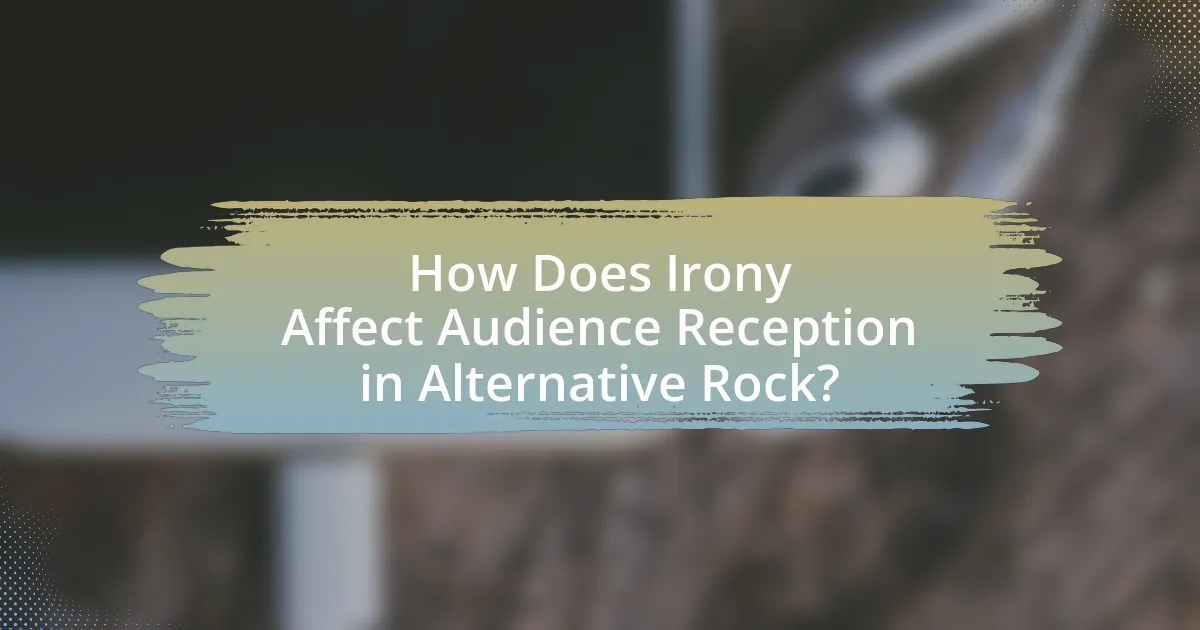
How Does Irony Affect Audience Reception in Alternative Rock?
Irony significantly influences audience reception in alternative rock by creating a layer of complexity that engages listeners on multiple levels. This genre often employs irony to challenge societal norms and expectations, prompting audiences to reflect critically on the themes presented in the music. For instance, bands like Radiohead and Weezer utilize ironic lyrics to juxtapose serious subjects with a playful tone, which can lead to a deeper emotional connection and provoke thought among listeners. Research indicates that irony in music can enhance enjoyment and appreciation, as it invites listeners to decipher meaning beyond the surface, thereby enriching their overall experience with the genre.
What are the emotional responses elicited by ironic content in songs?
Ironic content in songs elicits a range of emotional responses, including amusement, confusion, and introspection. Amusement arises from the contrast between the literal meaning of the lyrics and their intended ironic message, often leading to a humorous effect. Confusion can occur when listeners struggle to reconcile the irony with their expectations, prompting deeper engagement with the song’s themes. Introspection is frequently triggered as listeners reflect on the underlying messages and societal critiques embedded in the irony. Research indicates that irony in music can enhance emotional complexity, allowing listeners to experience multiple feelings simultaneously, which enriches their overall emotional response to the song.
How does irony create a sense of connection between the artist and the audience?
Irony creates a sense of connection between the artist and the audience by allowing the artist to express complex emotions and social critiques in a relatable manner. This technique engages the audience by prompting them to recognize the contrast between the surface meaning and the underlying message, fostering a shared understanding of the themes being explored. For instance, in alternative rock, artists often use irony to comment on societal norms or personal experiences, which resonates with listeners who may feel similarly disillusioned or conflicted. This shared recognition of irony can evoke a sense of camaraderie, as both the artist and the audience navigate the complexities of modern life together.
What role does irony play in shaping listener interpretations of a song?
Irony significantly influences listener interpretations of a song by creating layers of meaning that challenge straightforward understanding. In alternative rock, irony often juxtaposes lyrical content with musical tone, prompting listeners to question the sincerity or intent behind the message. For example, a song may present upbeat melodies while addressing serious themes, leading to a complex emotional response. This duality encourages listeners to engage critically with the lyrics, fostering a deeper connection to the song’s themes. Research indicates that irony can enhance emotional resonance, as it invites listeners to explore contrasting feelings, thereby enriching their overall experience of the music.
How has the perception of irony in alternative rock evolved over time?
The perception of irony in alternative rock has evolved from a tool for subversion in the 1980s and 1990s to a more nuanced expression of authenticity and self-awareness in contemporary music. Initially, bands like The Pixies and Nirvana employed irony to critique mainstream culture and the music industry, often using contrasting lyrical themes and musical styles to convey discontent. Over time, as the genre matured, artists began to embrace irony as a means of exploring personal and societal issues, leading to a more complex relationship with sincerity and authenticity. For instance, the rise of bands like Weezer and Death Cab for Cutie in the 2000s showcased a blend of ironic detachment with genuine emotional expression, reflecting a shift in audience expectations and cultural context. This evolution illustrates how irony in alternative rock has transitioned from mere critique to a multifaceted approach that balances humor, sincerity, and social commentary.
What changes have occurred in the use of irony from the 1990s to today?
The use of irony in alternative rock has evolved significantly from the 1990s to today, shifting from a primarily subversive tool to a more mainstream and often self-referential device. In the 1990s, bands like Nirvana and Radiohead employed irony to critique societal norms and commercialism, often using it to express disillusionment and authenticity. This was evident in lyrics that juxtaposed serious themes with a detached or sarcastic tone, reflecting the angst of the era.
In contrast, contemporary alternative rock artists frequently utilize irony in a more playful and self-aware manner, often embracing the absurdity of modern life and internet culture. For example, bands like Twenty One Pilots and artists like Billie Eilish incorporate irony to comment on personal and societal issues while also engaging with their audience in a more lighthearted way. This shift reflects broader cultural changes, including the rise of social media, where irony is often used for humor and relatability rather than solely for critique.
Thus, the evolution of irony in alternative rock from the 1990s to today illustrates a transition from a tool of critique to one of engagement and entertainment, mirroring changes in societal attitudes and communication styles.
How do contemporary artists reinterpret irony in their music?
Contemporary artists reinterpret irony in their music by blending self-awareness with social commentary, often using humor and absurdity to critique cultural norms. For instance, artists like Father John Misty and Fiona Apple employ ironic lyrics that juxtapose personal experiences with broader societal issues, creating a layered meaning that invites listeners to reflect critically. This approach is evident in Misty’s song “Pure Comedy,” where he satirizes modern life and the human condition, while Apple’s “Shameika” reflects on the complexities of identity and validation through a lens of irony. Such reinterpretations highlight the evolving nature of irony in music, allowing artists to engage with their audiences on multiple levels, making their work both entertaining and thought-provoking.
What are some practical tips for analyzing irony in alternative rock music?
To analyze irony in alternative rock music, focus on the lyrics, tone, and context of the songs. Examine how the lyrics may convey a meaning that contrasts with the literal interpretation; for instance, a song may express a carefree attitude while discussing serious themes like disillusionment. Additionally, pay attention to the vocal delivery and instrumentation, as these elements can enhance or undermine the ironic message. Contextualize the song within its cultural and historical background to understand the artist’s intent and the societal commentary being made. For example, the use of sarcasm in lyrics can reflect broader social critiques, as seen in works by bands like Radiohead or Nirvana, who often juxtapose upbeat melodies with darker themes.
How can listeners identify ironic elements in lyrics and music?
Listeners can identify ironic elements in lyrics and music by analyzing the contrast between the literal meaning of the words and the intended meaning conveyed through tone, context, and musical arrangement. For instance, a song may use upbeat melodies paired with lyrics that express sadness or disillusionment, creating a dissonance that signals irony. Additionally, listeners can look for hyperbolic statements or exaggerated emotions that suggest a deeper, often opposite sentiment. Research indicates that irony often relies on cultural references and shared knowledge, meaning that familiarity with the artist’s background and the socio-political context can enhance understanding. For example, the use of sarcasm in lyrics, where the artist states something contrary to their true feelings, can be a clear indicator of irony.
What resources are available for deeper exploration of irony in alternative rock?
Resources for deeper exploration of irony in alternative rock include academic journals, books, and online platforms. Notable academic journals such as “Popular Music” and “Journal of Popular Music Studies” often publish articles analyzing irony in music. Books like “The Irony of American History” by Reinhold Niebuhr and “Rock Music in American Popular Culture” by Michael A. O’Neill provide critical insights into the genre’s use of irony. Additionally, online platforms like JSTOR and Google Scholar offer access to a wide range of scholarly articles and papers focused on this topic. These resources collectively facilitate a comprehensive understanding of irony’s role in alternative rock music.
